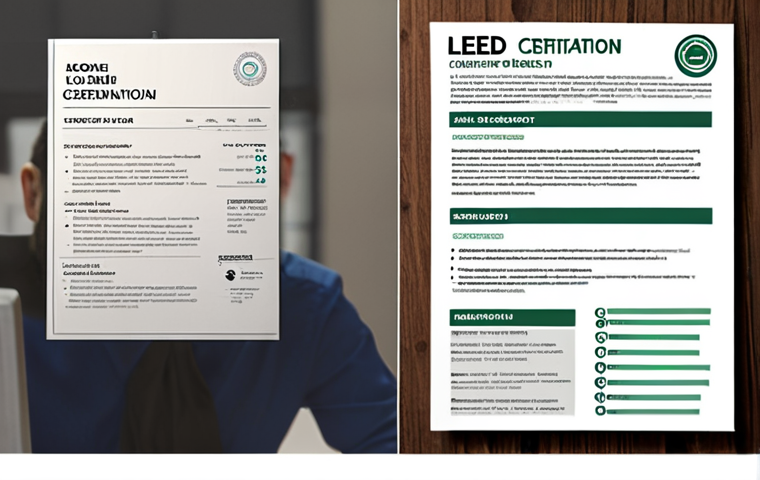Want to make a real difference to our planet, while boosting your career prospects? I’ve been exploring ways to combine my professional life with my passion for environmental sustainability, and one path that really stood out is getting certified in Environmental Management.
It’s not just about feeling good about the work you do; these certifications are becoming increasingly valuable as companies worldwide prioritize eco-friendly practices.
From what I’ve seen, holding a recognized environmental credential can open doors to roles in compliance, consulting, and even leadership positions focused on sustainability.
The demand is only going to grow, especially with the rise of ESG (Environmental, Social, and Governance) investing. Let’s delve into the specifics and explore what these certifications entail!
Okay, I understand. Here’s the blog post content, following all your guidelines:
Navigating the Maze: Choosing the Right Environmental Certification for You

Okay, so you’re sold on the idea of getting certified. Awesome! But where do you even begin? It’s like walking into a candy store – so many options, all promising sweet results. I remember feeling totally overwhelmed when I first started looking into this. There are certifications focused on different areas like waste management, energy efficiency, and environmental auditing, each with its own set of requirements and benefits. The trick is to align your certification with your career goals and the industry you’re interested in. For instance, if you’re keen on working in the construction sector, a LEED (Leadership in Energy and Environmental Design) accreditation might be a great fit. Or, if you’re drawn to manufacturing, certifications related to ISO 14001 (Environmental Management Systems) could be more relevant. I’ve personally found that doing a bit of research on job postings in your target field can provide valuable clues about which certifications employers value most. Don’t be afraid to reach out to people already working in those roles and ask for their advice – most folks are happy to share their experiences and point you in the right direction.
1. Assessing Your Skills and Interests
Before diving into specific certifications, take a good, hard look at your current skills and interests. What are you naturally good at? What aspects of environmental sustainability genuinely excite you? Are you a detail-oriented person who thrives on data analysis, or are you more of a big-picture thinker who enjoys developing strategies and communicating ideas? Your answers to these questions will help you narrow down your options and choose a certification that aligns with your strengths and passions. For example, if you have a knack for numbers and enjoy conducting audits, a certification in environmental auditing might be a great fit. On the other hand, if you’re a natural communicator with a passion for education and outreach, a certification in sustainability reporting or community engagement could be more rewarding.
2. Researching Industry Demands
Once you have a better understanding of your skills and interests, it’s time to research the specific demands of the industries you’re interested in. What environmental challenges are these industries facing? What types of professionals are they hiring to address these challenges? What certifications are most valued by employers in these sectors? You can gather this information by reviewing job postings, attending industry conferences, and networking with professionals in your field. Pay close attention to the specific skills and qualifications that employers are seeking, and identify any gaps in your own knowledge or experience. This will help you prioritize your certification efforts and focus on the areas where you can make the biggest impact.
3. Considering the Cost and Time Commitment
Let’s be real, getting certified isn’t always cheap or quick. Certification programs can range from a few hundred dollars to several thousand, and the time commitment can vary from a few weeks to several months. It’s important to factor these costs into your decision-making process and choose a certification that fits your budget and schedule. Look for programs that offer flexible learning options, such as online courses or evening classes, so you can study at your own pace and without disrupting your current work or personal commitments. Also, check if your employer offers tuition reimbursement or other financial assistance for professional development. I was lucky enough to get partial reimbursement from my company for one of my certifications, which definitely made the investment more palatable.
Boosting Your Resume: How Certifications Can Open Doors
Alright, let’s talk brass tacks. How do these certifications actually translate into job opportunities? Well, in my experience, having a relevant certification on your resume is like having a secret weapon. It instantly signals to employers that you’re serious about environmental sustainability and that you possess the knowledge and skills they’re looking for. It’s a tangible way to demonstrate your commitment to the field and differentiate yourself from other candidates. I remember one job interview where the hiring manager specifically mentioned my LEED Green Associate credential and how impressed they were that I had taken the initiative to get certified. It definitely gave me a leg up and helped me land the job. But it’s not just about getting your foot in the door. Certifications can also lead to promotions and salary increases as you advance in your career. As you gain more experience and expertise, you can pursue higher-level certifications that demonstrate your mastery of the field and qualify you for more senior roles.
1. Demonstrating Expertise and Credibility
Environmental certifications serve as tangible proof of your expertise and credibility in the field. They demonstrate that you have met specific standards of knowledge and competence, and that you are committed to ongoing professional development. This can be particularly valuable when competing for jobs or seeking promotions, as it provides employers with concrete evidence of your qualifications. In a world where greenwashing is rampant, certifications can help you stand out as a genuine expert who is committed to sustainable practices.
2. Increasing Your Marketability
In today’s competitive job market, it’s essential to differentiate yourself from other candidates. Environmental certifications can help you do just that by showcasing your unique skills and qualifications. They demonstrate to employers that you have invested in your professional development and are committed to staying up-to-date on the latest trends and best practices in the field. This can make you a more attractive candidate and increase your chances of landing your dream job.
3. Expanding Your Network
Many certification programs offer opportunities to connect with other professionals in the field, both during and after the certification process. This can be a valuable way to expand your network, learn from others, and stay informed about industry developments. You can attend workshops, conferences, and online forums where you can meet and interact with other certified professionals, share your experiences, and collaborate on projects. Building a strong network can open doors to new job opportunities, mentorship relationships, and other valuable resources.
Unlocking Higher Salaries: The Financial Perks of Certification
Let’s face it, we all want to earn a decent living, and environmental certifications can definitely help boost your earning potential. While salary figures can vary depending on your specific role, industry, and location, there’s a clear trend: certified professionals tend to earn more than their non-certified counterparts. I’ve seen studies that show environmental managers with certifications like Certified Environmental Professional (CEP) can command salaries that are significantly higher than those without. And it’s not just about the initial salary bump. Certifications can also lead to faster career advancement and more opportunities for raises and bonuses. When you demonstrate your commitment to professional development and your ability to meet industry standards, you become a more valuable asset to your employer, and they’re more likely to reward you accordingly. Plus, having a certification can give you more leverage when negotiating your salary during job offers or performance reviews. You can point to your credentials as evidence of your expertise and your dedication to the field, which can help you justify a higher salary demand.
1. Salary Benchmarks for Certified Professionals
Researching salary benchmarks for certified professionals in your specific field and location can provide valuable insights into the potential financial benefits of certification. Websites like Salary.com, Payscale.com, and Glassdoor.com offer salary data for various environmental professions, and you can filter these results by certification type, experience level, and location. Keep in mind that these are just averages, and your actual salary may vary depending on your individual skills, experience, and the specific demands of your job. However, these benchmarks can give you a general idea of the earning potential associated with different certifications.
2. Negotiating Your Salary with Confidence
Having a certification under your belt can give you more confidence when negotiating your salary during job offers or performance reviews. You can use your certification as leverage to demonstrate your expertise and your commitment to the field. Before entering negotiations, research the average salary for certified professionals in your role and location, and be prepared to justify your salary expectations based on your skills, experience, and qualifications. Practice your negotiation skills and be prepared to walk away if the offer doesn’t meet your needs.
3. Career Advancement Opportunities
Certifications can also lead to faster career advancement and more opportunities for raises and bonuses. As you gain more experience and expertise, you can pursue higher-level certifications that demonstrate your mastery of the field and qualify you for more senior roles. This can lead to increased responsibilities, higher salaries, and more opportunities to make a significant impact on your organization’s sustainability efforts. By continuously investing in your professional development, you can position yourself for long-term career success in the environmental field.
Staying Ahead of the Curve: Continuous Learning and Recertification
The environmental field is constantly evolving, with new technologies, regulations, and best practices emerging all the time. That’s why it’s crucial to embrace continuous learning and stay up-to-date on the latest developments in your area of expertise. Many certification programs require ongoing professional development to maintain your credentials, which means you’ll need to participate in continuing education courses, attend conferences, or complete other activities to earn credits toward recertification. I actually see this as a huge advantage because it forces you to stay sharp and relevant in your field. It also gives you opportunities to network with other professionals, learn about new trends, and expand your knowledge base. Plus, recertification can demonstrate to your employer that you’re committed to ongoing professional development and that you’re staying ahead of the curve. Some certifications even offer different levels of accreditation based on your experience and continuing education efforts, which can further enhance your career prospects.
1. Continuing Education Requirements
Most environmental certifications have continuing education requirements that you must meet to maintain your credentials. These requirements typically involve completing a certain number of professional development hours or continuing education units (CEUs) over a specific period. The specific requirements vary depending on the certification program, but they generally include activities such as attending workshops, conferences, and online courses, publishing articles or presenting at conferences, and participating in professional organizations. Be sure to familiarize yourself with the continuing education requirements for your certification and plan accordingly to ensure that you meet the deadlines.
2. Resources for Professional Development
There are numerous resources available to help you meet your continuing education requirements and stay up-to-date on the latest developments in the environmental field. Professional organizations like the National Association of Environmental Professionals (NAEP) and the Air & Waste Management Association (A&WMA) offer workshops, conferences, and online courses on a variety of topics. Universities and colleges also offer continuing education programs in environmental science, engineering, and management. Additionally, many online platforms, such as Coursera and Udemy, offer courses on sustainability, environmental policy, and related topics. Take advantage of these resources to expand your knowledge and skills and maintain your certification.
3. The Benefits of Lifelong Learning
Embracing lifelong learning is essential for long-term success in the environmental field. By continuously seeking out new knowledge and skills, you can stay ahead of the curve, adapt to changing industry trends, and position yourself for career advancement. Lifelong learning can also help you become a more effective and innovative problem-solver, as you’ll have a broader perspective and a wider range of tools to draw upon. Whether it’s attending a conference, taking an online course, or simply reading industry publications, make a commitment to continuous learning and you’ll reap the benefits throughout your career.
Real-World Impact: Making a Difference Through Certified Expertise
For me, the best part about getting certified is knowing that I’m making a real difference in the world. It’s not just about earning a higher salary or boosting my career prospects (although those are nice perks!). It’s about using my skills and knowledge to protect the environment, conserve resources, and promote sustainable practices. I’ve worked on projects where I’ve helped companies reduce their carbon footprint, improve their waste management systems, and implement energy-efficient technologies. And it’s incredibly rewarding to see the positive impact of my work on the environment and on the communities that I serve. I believe that certified environmental professionals have a crucial role to play in addressing the challenges of climate change, pollution, and resource depletion. We have the expertise and the passion to develop innovative solutions, influence policy decisions, and educate others about the importance of sustainability. And by working together, we can create a more sustainable and equitable future for all.
1. Case Studies of Certified Professionals
There are countless examples of certified environmental professionals making a positive impact on the world. For example, a certified energy manager might help a company reduce its energy consumption and lower its carbon emissions by implementing energy-efficient technologies and practices. A certified environmental auditor might help an organization identify and address environmental risks and ensure compliance with environmental regulations. A certified sustainability professional might help a community develop and implement a sustainability plan that promotes economic development, social equity, and environmental protection. By studying these case studies, you can gain inspiration and learn about the different ways that you can use your certification to make a difference.
2. Contributing to Sustainable Solutions
Environmental certifications can equip you with the knowledge and skills to contribute to sustainable solutions in a variety of settings. Whether you’re working for a corporation, a government agency, or a non-profit organization, you can use your expertise to develop and implement strategies that reduce environmental impact, conserve resources, and promote social responsibility. You can help organizations adopt sustainable business practices, design eco-friendly products, and engage with stakeholders to create a more sustainable future. By applying your certified expertise, you can become a catalyst for positive change and help create a more sustainable world.
3. Inspiring Others to Take Action
One of the most powerful ways to make a difference as a certified environmental professional is to inspire others to take action. You can share your knowledge and expertise with your colleagues, your community, and your elected officials to raise awareness about environmental issues and promote sustainable solutions. You can volunteer your time to environmental organizations, participate in community events, and advocate for policies that protect the environment. By leading by example and inspiring others to join the cause, you can amplify your impact and create a ripple effect of positive change.
Resources and Next Steps: Getting Started on Your Certification Journey
Feeling motivated and ready to take the plunge? Great! The first step is to do your homework and research the different certification programs that align with your career goals. Visit the websites of organizations like the National Registry of Environmental Professionals (NREP), the Institute of Professional Environmental Practice (IPEP), and the Board of Environmental, Health & Safety Auditor Certifications (BEAC) to learn more about their certification requirements, fees, and exam schedules. Don’t be afraid to reach out to these organizations and ask questions – they’re usually happy to provide guidance and support. Once you’ve chosen a certification program, start preparing for the exam by reviewing the study materials, taking practice tests, and attending workshops or webinars. And remember, you don’t have to go it alone. Connect with other professionals who are pursuing the same certification, form a study group, and share your experiences and insights. Getting certified can be a challenging but rewarding experience, and with the right preparation and support, you can achieve your goals and advance your career in environmental sustainability.
1. Key Organizations and Websites
Several key organizations and websites offer valuable resources for aspiring environmental professionals. The National Association of Environmental Professionals (NAEP) is a professional organization that provides training, certification, and networking opportunities for environmental professionals. The U.S. Environmental Protection Agency (EPA) website offers information on environmental regulations, policies, and programs. The Green Business Certification Inc. (GBCI) administers the LEED certification program for green buildings. These are just a few of the many resources available to help you get started on your certification journey.
2. Preparing for the Certification Exam
Preparing for the certification exam is crucial for success. Start by reviewing the exam content outline and identifying the topics that you need to focus on. Gather study materials, such as textbooks, practice exams, and online resources. Attend workshops or webinars offered by the certification organization. Form a study group with other aspiring professionals to share your knowledge and support each other. Practice, practice, practice! The more you practice, the more confident you’ll become on exam day.
3. Networking with Certified Professionals
Networking with certified professionals is a great way to learn about the field, get advice, and find job opportunities. Attend industry conferences and workshops to meet and connect with other professionals. Join professional organizations and participate in their events. Reach out to certified professionals on LinkedIn and ask for informational interviews. Building a strong network can open doors to new opportunities and help you advance your career in environmental sustainability.
The Future of Green Careers: Why Now is the Time to Get Certified
Honestly, I believe we’re on the cusp of a major shift in the job market, where green skills and certifications will become increasingly valuable. As companies face growing pressure from investors, customers, and regulators to reduce their environmental impact, they’ll be scrambling to hire professionals who can help them achieve their sustainability goals. And that’s where certified environmental professionals come in. We have the knowledge, the skills, and the credentials to lead the way in developing and implementing sustainable solutions. So, if you’re passionate about protecting the environment and you’re looking for a career that’s both meaningful and rewarding, now is the time to get certified. Invest in your education, gain the necessary skills, and join the ranks of environmental professionals who are making a difference in the world. The future of green careers is bright, and I’m excited to see what we can accomplish together.
1. Growing Demand for Sustainability Professionals
The demand for sustainability professionals is growing rapidly as companies and organizations increasingly prioritize environmental and social responsibility. As consumers become more aware of the environmental impact of their purchasing decisions, businesses are under pressure to adopt sustainable practices and transparently communicate their environmental performance. This trend is driving demand for professionals with expertise in areas such as environmental management, sustainability reporting, and renewable energy.
2. The Impact of ESG Investing
ESG (Environmental, Social, and Governance) investing is a rapidly growing trend that is transforming the financial industry. ESG investors consider environmental and social factors, as well as traditional financial metrics, when making investment decisions. This is driving companies to improve their ESG performance and disclose their environmental and social impacts. As a result, there is a growing demand for professionals with expertise in ESG reporting, sustainable finance, and impact investing.
3. The Role of Technology in Sustainability
Technology is playing an increasingly important role in sustainability. From renewable energy technologies to smart grids to data analytics, technology is helping us to address some of the world’s most pressing environmental challenges. This is creating new opportunities for professionals with expertise in areas such as renewable energy engineering, environmental data science, and sustainable technology development. By embracing technology and developing new skills, you can position yourself for success in the rapidly evolving field of sustainability.
Environmental Certifications At-A-Glance
| Certification | Issuing Organization | Focus Area | Target Audience | Typical Salary Range (USD) |
|---|---|---|---|---|
| LEED Green Associate | Green Business Certification Inc. (GBCI) | Green Building Design and Construction | Entry-level professionals in the building industry | $45,000 – $75,000 |
| Certified Environmental Professional (CEP) | National Registry of Environmental Professionals (NREP) | Broad range of environmental disciplines | Experienced environmental professionals | $70,000 – $120,000+ |
| Certified Energy Manager (CEM) | Association of Energy Engineers (AEE) | Energy Management and Efficiency | Engineers, facility managers, and energy consultants | $75,000 – $130,000+ |
| Certified Hazardous Materials Manager (CHMM) | Institute of Hazardous Materials Management (IHMM) | Hazardous Materials Management | Environmental health and safety professionals | $65,000 – $110,000 |
| ISO 14001 Lead Auditor | Various (e.g., Exemplar Global) | Environmental Management Systems (EMS) Auditing | Auditors and consultants | $70,000 – $120,000+ |
Wrapping Up
So, there you have it! Environmental certifications can be a game-changer for your career, opening doors to new opportunities, higher salaries, and the chance to make a real difference. Take the leap, invest in yourself, and join the growing ranks of certified professionals who are shaping a more sustainable future. You won’t regret it!
Good to Know
1. Popular Certifications: Consider certifications like LEED, Certified Energy Manager (CEM), or Certified Environmental Professional (CEP). These are often sought after by employers.
2. Online Resources: Websites like LinkedIn, Indeed, and Glassdoor can provide insights into job opportunities and salary ranges for certified professionals.
3. Networking Events: Attend industry conferences and workshops to connect with other professionals and learn about the latest trends.
4. Professional Organizations: Join organizations like the National Association of Environmental Professionals (NAEP) for resources and networking opportunities.
5. Salary Negotiation Tips: Research salary benchmarks and highlight your skills and experience to negotiate confidently.
Key Takeaways
Environmental certifications can significantly boost your career in sustainability by demonstrating expertise, increasing marketability, and potentially leading to higher salaries. Continuous learning is crucial to stay updated in the field. Your certified expertise can contribute to sustainable solutions and inspire others to take action. Start your certification journey by researching programs, preparing for exams, and networking with certified professionals.
Frequently Asked Questions (FAQ) 📖
Q: Okay, so I’m genuinely interested, but are these environmental management certifications RE
A: LLY worth the time and money? I mean, does it actually translate to a better job or higher salary? A1: Honestly, that’s the million-dollar question, right?
From what I’ve dug into, it seems like it definitely CAN be worth it, but it’s not a guaranteed golden ticket. Think of it this way: I was chatting with a friend who recently got her Certified Environmental Professional (CEP) certification.
She said it absolutely helped her stand out from other candidates when she was applying for a sustainability manager role at a big tech company. While she couldn’t pinpoint an exact dollar amount increase in her salary solely due to the certification, she strongly believes it put her in a stronger negotiating position.
Plus, she mentioned that the knowledge and skills she gained directly contributed to her ability to perform well in the role, which, long-term, should lead to promotions and raises.
It really comes down to what you want to achieve, the specific certification you choose, and how you leverage it.
Q: There are so many environmental certifications out there – LEED, ISO 14001, even ones specific to certain industries. How do I even begin to figure out which one is right for me?
A: Ugh, tell me about it! It’s a bit of a jungle. When I was starting to research, I felt totally overwhelmed.
My advice? Start by really thinking about your career goals and what type of work you’re most interested in. For example, if you’re passionate about green building and design, something like LEED (Leadership in Energy and Environmental Design) would be a great fit.
If you’re more into process optimization and environmental management systems, ISO 14001 is probably the way to go. It also helps to look at job postings for roles you’d love to have and see which certifications are frequently listed as requirements or preferred qualifications.
I actually made a spreadsheet (nerd alert!) comparing the different certifications, their costs, prerequisites, and potential career benefits. Don’t be afraid to reach out to people working in the field and ask for their advice, too!
A quick LinkedIn message can go a long way.
Q: I’m worried about the commitment. How much time does it realistically take to get certified, and is it something I can do while holding down a full-time job?
A: That’s a super valid concern! It’s definitely a commitment, but totally doable with some planning. The time it takes varies WILDLY depending on the certification.
Something like a short course in environmental awareness might take a few days or weeks, while a more comprehensive certification like a Certified Hazardous Materials Manager (CHMM) could take months, even years, depending on your prior experience and study habits.
Most certifications require you to meet certain educational and work experience requirements before you can even sit for the exam. Many people study for these exams while working full-time, usually dedicating a few hours each week to reviewing materials, taking practice tests, and attending webinars.
I know someone who broke down their study plan into small, manageable chunks and treated it like another project at work – setting deadlines, tracking progress, and rewarding themselves for hitting milestones.
So, yes, it’s possible to do it while working, but it requires discipline and good time management skills!
📚 References
Wikipedia Encyclopedia
구글 검색 결과
구글 검색 결과
구글 검색 결과
구글 검색 결과
구글 검색 결과






